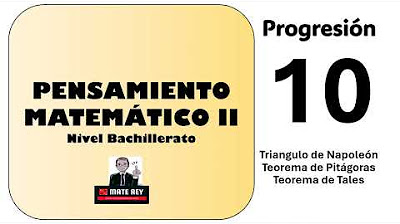Pemecahan Masalah Matematika #Pengembangan Pembelajaran Matematika
Summary
TLDRThis educational video delves into the importance of problem-solving in mathematics, highlighting both routine and non-routine problems. It discusses how these problems foster key skills such as perseverance, critical thinking, creativity, and collaboration. The video emphasizes the role of constructivism in learning, encouraging students to solve problems within their zone of proximal development (ZPD). Furthermore, it links mathematical problem-solving to real-life applications and stresses the significance of communication and conceptual connections in learning. Overall, it shows how math challenges students to think deeply and practically, preparing them for both academic and real-world success.
Takeaways
- 😀 Problem-solving in mathematics is essential for students to develop critical cognitive and practical skills.
- 😀 Routine problems can be solved using predefined formulas or methods, while non-routine problems require deeper analysis and creative thinking.
- 😀 Understanding the distinction between routine and non-routine problems is crucial for effective problem-solving in math education.
- 😀 Non-routine problems often involve constructing mathematical models, which help students develop higher-order thinking skills.
- 😀 Vygotsky's concept of the Zone of Proximal Development (ZPD) emphasizes the importance of teacher and peer support in helping students solve problems.
- 😀 Effective problem-solving tasks should be challenging but not overwhelming, as problems that are too easy or too hard can lead to disengagement.
- 😀 The development of critical thinking and creativity is key in tackling non-routine problems and fostering independent problem-solving skills.
- 😀 Collaboration with peers enhances communication skills and encourages the sharing of ideas and strategies for solving problems.
- 😀 Problem-solving should relate to real-world contexts to help students see the practical applications of mathematical concepts.
- 😀 Teachers should encourage students to reflect on their cognitive development, especially as they progress from concrete to abstract thinking in solving problems.
Q & A
What is the primary goal for students learning mathematics in school?
-The primary goal is to solve mathematical problems, which is considered a key competency in mathematics education.
What is the difference between routine and non-routine problems in mathematics?
-Routine problems have a clear formula or method that can be directly applied to find the solution, while non-routine problems require students to create a model or develop a method to solve them, often involving more complex reasoning.
Why is problem-solving an essential skill for students in mathematics?
-Problem-solving helps students develop critical skills such as logical thinking, persistence, and creativity. It is fundamental for understanding mathematical concepts and applying them to real-world situations.
How does Vygotsky's concept of the Zone of Proximal Development (ZPD) apply to problem-solving in mathematics?
-Vygotsky's ZPD suggests that students can solve problems with guidance and support from a teacher or peer, pushing them just beyond their current capabilities. Problems that are too easy or too hard can demotivate students, so the problem should be within their ZPD for optimal learning.
What role does cognitive development, according to Piaget, play in a student's ability to solve problems?
-Piaget's theory of cognitive development states that as students grow, they develop the ability to think more abstractly and logically. As they reach the formal operational stage, they can handle more complex, abstract problem-solving tasks, which is crucial for solving non-routine problems.
What is the process of mathematical modeling in problem-solving?
-Mathematical modeling involves transforming a real-world problem into a mathematical form that can be solved using mathematical principles. It requires students to construct ideas, make assumptions, and apply mathematical concepts to find solutions.
What are some key characteristics of routine problems in mathematics?
-Routine problems typically have clear steps or formulas to follow and can be solved using straightforward mathematical methods without much need for creativity or conceptual understanding.
How does solving non-routine problems help students develop critical and creative thinking?
-Solving non-routine problems requires students to think critically about the problem, identify relevant concepts, and create novel methods for solving it. This enhances their ability to apply mathematical thinking in varied and complex situations.
Why is it important for students to understand the relevance of mathematics in daily life?
-Understanding the relevance of mathematics helps students see its practical applications, making the subject more meaningful. It encourages them to use mathematical concepts to solve real-life problems, thus improving their problem-solving skills.
What skills can be developed through collaborative problem-solving in mathematics?
-Collaborative problem-solving helps students develop communication skills, teamwork, and the ability to articulate mathematical ideas. It also fosters mutual support, allowing students to share strategies and insights, thus deepening their understanding of mathematical concepts.
Outlines

Этот раздел доступен только подписчикам платных тарифов. Пожалуйста, перейдите на платный тариф для доступа.
Перейти на платный тарифMindmap

Этот раздел доступен только подписчикам платных тарифов. Пожалуйста, перейдите на платный тариф для доступа.
Перейти на платный тарифKeywords

Этот раздел доступен только подписчикам платных тарифов. Пожалуйста, перейдите на платный тариф для доступа.
Перейти на платный тарифHighlights

Этот раздел доступен только подписчикам платных тарифов. Пожалуйста, перейдите на платный тариф для доступа.
Перейти на платный тарифTranscripts

Этот раздел доступен только подписчикам платных тарифов. Пожалуйста, перейдите на платный тариф для доступа.
Перейти на платный тарифПосмотреть больше похожих видео

Makna dan Klasifikasi Masalah dalam Matematika

Ler, escrever e resolver problemas | Kátia Smole e Maria Diniz (Org.) I Capítulos IV e V

Ler, escrever e resolver problemas | Kátia Smole e Maria Diniz (Org.) I Capítulo VI

Pensamiento Matemático II PROGRESION 10

How to develop problem solving skills | IIT prof's advice

"Al-Quran and Math" With Miss Merisya, S.Si., S.Pd Part 2
5.0 / 5 (0 votes)
